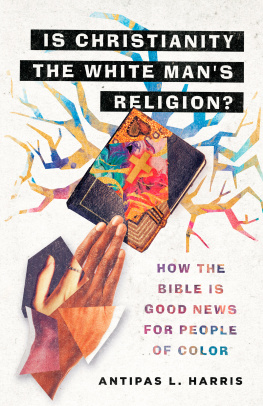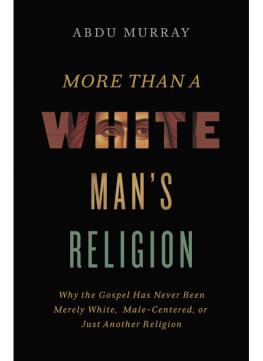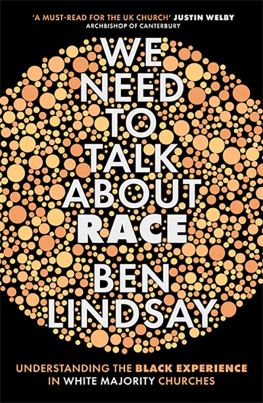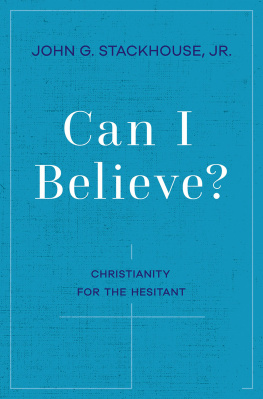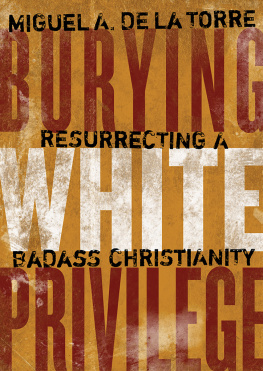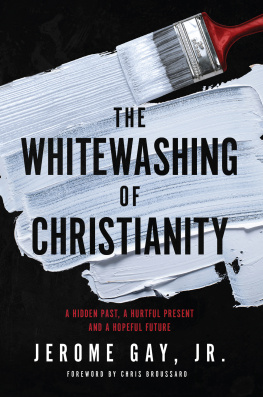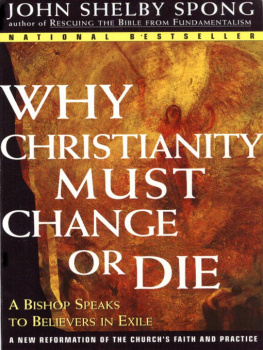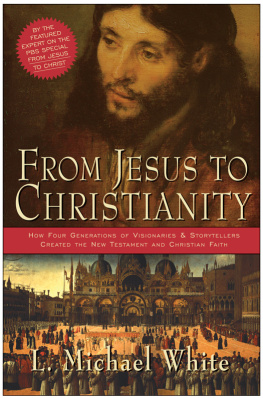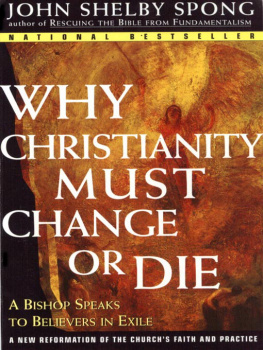Sommaire
Pagination de l'dition papier
Guide
IS CHRISTIANITY
THE WHITE MANS
RELIGION?
HOW THE BIBLE IS
GOOD NEWS FOR
PEOPLE OF COLOR
ANTIPAS L. HARRIS
InterVarsity Press
P.O. Box 1400, Downers Grove, IL 60515-1426
ivpress.com
2020 by Antipas Lewis Harris
All rights reserved. No part of this book may be reproduced in any form without written permission from InterVarsity Press.
InterVarsity Press is the book-publishing division of InterVarsity Christian Fellowship/USA, a movement of students and faculty active on campus at hundreds of universities, colleges, and schools of nursing in the United States of America, and a member movement of the International Fellowship of Evangelical Students. For information about local and regional activities, visit intervarsity.org.
All Scripture quotations, unless otherwise indicated, are taken from The Holy Bible, New International Version, NIV. Copyright 1973, 1978, 1984, 2011 by Biblica, Inc. Used by permission of Zondervan. All rights reserved worldwide. www.zondervan.com. The NIV and New International Version are trademarks registered in the United States Patent and Trademark Office by Biblica, Inc.
While any stories in this book are true, some names and identifying information may have been changed to protect the privacy of individuals.
Cover design and image composite: David Fassett
Interior design: Daniel van Loon
Images: cropped female hand: Ling Luo / EyeEm / Getty Images; cardstock texture: Zakharova_Natalia / iStock / Getty Images Plus; light wood texture: t_trifonoff / iStock / Getty Images Plus; blank postage stamp: troyek / E+ / Getty Images; watercolor background: Sergey Ryumin / Moment Collection / Getty Images; gold foil texture: Katsumi Murouchi / Moment Collection / Getty Images; abstract background: oxygen / Moment Collection / Getty Images; abstract oil painting: photominus / iStock / Getty Images Plus; two hands typing: Emma Innocenti / Digital Vision / Getty Images; Afro American female hand: LightFieldStudios / iStock / Getty Images Plus; Holy Bible with cover glow: boonchai wedmakakawand / Moment Collection / Getty Images; Mosaic of Jesus Christ: Lilly3 / iStock / Getty Images Plus; hand: Hanis / E+ / Getty Images; abstract watercolor: lutavia / iStock / Getty Images Plus; tree illustration: izumikobayashi / iStock / Getty Images Plus; blue watercolor: licccka / iStock / Getty Images Plus; Bible: DNY59 / iStock / Getty Images Plus
ISBN 978-0-8308-4825-6 (digital)
ISBN 978-0-8308-4599-6 (print)
This digital document has been produced by Nord Compo.
DEDICATION
I would like to dedicate this book to
Jakes Divinity School, where we are forming people of faith for innovative leadership in the church and society;
the furtherance of rigorous knowledge and deep spirituality, for the purpose of defending the faith and bearing
witness in the public square;
the global yearning for reconciliation;
and all those who wonder whether God cares about them.
PART ONE
The Church and Threatening
Contemporary
Ideas
CHAPTER ONE
THE STRIKING QUESTION
Race in America is a form of religious faith, and we will never be able to understand or address it with the necessary knowledge, energy or commitment until we comprehend its true architecture.... How might we overturn this racial architecture that is built inside Christian life and practice in the West?
WILLIE JENNINGS
I was teaching a graduate course on ministry leadership when a twenty-two-year-old student interrupted my lecture with a bizarre question: What do you say to your friends who are leaving the church and arguing that Christianity is the white mans religion?
I was taken aback by the question. First, it was unrelated to the topic of the day. Second, I wondered who in the world would argue such a thing.
The class discussion that ensued opened up a world of discovery. I couldnt shake the conversation out of my mind for several weeks. Since then, Ive learned that many young people of color across North America, all over Europe, and throughout Africa are often wary of Christianity because of current religious alignments with divisive politics, not to mention the global history of pain already associated with branches of Christianity. Many Christians (like I was) are unaware of the current conversations about this on the streets. My concern and subsequent research led me to write this book.
The question of whether Christianity is a trustworthy religion for everyone is not new. Over the years, many people and groups have asked this question. For example, the Nation of Islam was convinced that Christianity was the white mans religion, dating back to the Jim Crow era of racial segregation. It is deeply concerning that since then, after all the changes that have taken place, this question has resurfaced. A new wave of religious skeptics has arrived with serious questions about faith, identity, and the struggles of everyday life. From followers of the Nation of Islam and the Five Percent Nation to students of Science and Consciousness and others, there is a circumspection regarding oppressive attitudes and beliefs associated with the history of Western Christian practice. Times have changed, but similar observations that provoked the question years ago are provoking skepticism today.
The students question brought to mind three distinct situations, one of which occurred in 2002 when I was a student at Yale Divinity School. Just outside the barbershop on Dixwell Avenue in New Haven, Connecticut, a group of self-identified black, Jewish men sold kosher hot dogs. One day, one of them stopped me and asked who I was, where I was from, and what I did. My interest in theological studies caught his attention. He felt the need to share with me that black people are the true Jews. To be honest, the conversation was rather intriguing; it was my first encounter with an African American who claimed to have found his true identity. His serious and intelligent conversation kept my attention for longer than I intended. Before this point, my only point of reference to black Jews was Ethiopian Jews. It was clear, however, that the brother in New Haven was not talking about the Jews who are native to Ethiopia. He was saying that African Americans are Israelites and dont know it.
Several years later, I was invited to speak on urban evangelism for the Solid Rock Church Conference at the Founders Inn in Virginia Beach. A pastor from Washington, DC, expressed concern about a group of African Americans who seemed to connect well with the young black men in Washingtons distressed areas. He explained that these men wore yarmulkes, called themselves Israelites, and sought to convince other young men that Christianity is the white mans religion and that black people are the true Israelites. It was an earful! Immediately, I made the connection with the black Israelite I had previously met in New Haven.
In 2011, I went with a group of college students to New York for an Urban Plunge Excursion. We partnered with the New York School of Urban Ministry (NYSUM). Students interested in urban evangelism joined us on 125th Street to pray with passersby. Energized by the pedestrians openness to spontaneous prayer, some of the students wandered a bit further down 125th Street to a bus stop near the Apollo Theater.

